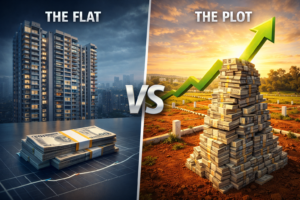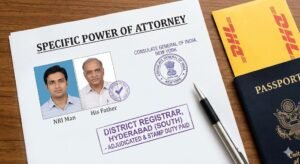All about KMC Property Tax in Kolkata
Property Tax is the yearly tax that the government imposes on real estate properties. These monies are raised by the respective municipalities to support their residents’ access to additional services and amenities.
In the same vein, Kolkatan homeowners are required to submit an annual tax return to the Kolkata Municipal Corporation, or KMC. Here, we’ve gathered some crucial information on Kolkata Municipal Corporation property taxes and created a thorough how-to manual to make things easier.
Understanding KMC Property Tax
On December 15, 2016, the Kolkata Municipal Corporation Bill was approved, streamlining the tax collection procedure. This gave the Kolkata Municipal Corporation, or KMC, the authority to determine a person’s property tax liability and to regulate rate increases and decreases.
Process of KMC property tax calculation
The Unit Area Assessment (UAA) scheme is used by KMC to calculate property taxes. Property owners can easily calculate their taxes under this approach.
Here are a few crucial UAA system guidelines:
- The city is split into 293 blocks under this plan, and those blocks are further split into 7 categories, numbered A through G. This depends on things like the market worth of the property, the infrastructure, and other amenities.
- Base Unit Area Value, or BUAV, is the annual value expressed in square feet for each of the various categories. Category A has the highest BUAV value, while Category G has the lowest.
- To lessen the tax burden on these economically disadvantaged groups, the slum areas surrounding Kolkata are classified as category G.
- Category E includes the Refugee Rehabilitation Colony (RR Colony) and housing under the government’s EWS and BSUP programs.
Almost 6 lakh taxpayers who own corporation property in Kolkata are covered by this consistent tax calculation scheme.
1) Base Unit Area Calculation
| Block category | BUAV per sq. ft (in Rs) |
| A | 74 |
| B | 56 |
| C | 42 |
| D | 32 |
| E | 24 |
| F | 18 |
| G | 13 |
2) Multiplicative Factors (MF)
| Property Location (Road Width) | MF |
| ≤ 2.5m | 0.6 |
| >2.5 m but ≤ 3.5 m | 0.8 |
| >3.5 m but ≤ 12 m | 1 |
| >12 m | 1.2 |
| Building Age | MF |
| > 20 years | 1 |
| <20 years > 50 years | 0.9 |
| < 50 years | 0.8 |
| Occupancy Status | MF |
| Tenant-occupied property with a tenancy of less than 20 years is utilized for non-residential purposes. | 4 |
| Tenant-occupied property with a tenure of less than 20 years is used for residential purposes. | 1.5 |
| Garage/parking space/fee | 4 |
| Tenant-occupied property with a tenure of more than 20 but less than 50 years is not protected under West Bengal premises. | 1.2 |
| Tenant-occupied property with a tenancy lasting more than 20 years but less than 50 years is protected under West Bengal law. | 1 |
| Property under tenant’s occupation, tenancy > 50 years old | 1 |
| Property under family owner’s occupation | 1 |
| Building Usage | MF |
| Residential use | 1 |
| Waterbody | 0.5 |
| Health, educational institution, single-screen movie hall, hotel ( 3-star), and bar. | 3 |
| Industrial/manufacturing, shop<250 sq. ft., Restaurant | 2 |
| 3-star and 4-star hotels, ceremonial house | 4 |
| Multiplex, mall, commercial shops | 6 |
| Office, bank, hotel 5-star or more | 5 |
| Night club, offsite ATM, tower, hoarding | 7 |
| Vacant land up to 5 kottah not falling under the above categories | 2 |
| Vacant land more than 5 kottah | 8 |
| Building Structure | MF |
| Residential building, plot size > 10 kottah | 1.5 |
| Property under tenant’s occupation, tenancy ≤ 20 years used for residential purpose | 1.5 |
| IG’s special projects include residences with covered spaces of more than 2000 square feet. | 1.5 |
| Pucca properties | 1 |
| Open and covered parking spaces and garage | 0.8 |
| Semi-pucca | 0.6 |
| Common area | 0.5 |
| Kutcha | 0.5 |
See the following table to learn how the tax rate varies depending on the kind of property.
| Property Type | Tax Rate (%) |
| Undeveloped slums | 6 |
| Developed slums | 8 |
| Government properties under KMC Act, 1980 | 10 |
| Properties with annual value <Rs 30, 000 | 15 |
| Others | 20 |
How to Pay KMC Property Tax Online?
i) KMC Property Tax Online Payment
- The steps to pay your KMC taxes online are listed below:
- Go to KMC’s official website.
- Select the “Make Online Payment” option from the menu on your right.
- Select “Property Tax Option.”
- Next, Select the “All Bill” option. You will find a page on delinquent property taxes here.
- Enter the required information (email address, assessee number, and contact number).
- Select the “Search” option. At last, the amount of property taxes owed is visible to you.
- Pay the amount specified on the website.
You will receive an electronic receipt upon completing the online KMC property tax payment. Keep it handy for future use.
ii) KMC Offline Property Tax Procedure
- The steps below must be taken to choose to pay your KMC property tax offline.
- You must go to the municipal corporation in your area.
- Once you’ve visited the center, you must obtain an application.
- Complete the application form online by providing all the information outlined above.
- Once finished, send the application to the appropriate authority.
- You will obtain a KMC property tax receipt upon payment of the fee. Save it for later use.
How Can I Check The Status Of My Online Tax Payment?
To find out the status of your online property tax payment for Kolkata Municipal Corporation, visit the official portal. You can determine the status of your KMC property tax payment by entering the property details on the official website.
How Can the Tax Receipt Be Generated?
The tax receipt or challan is essential to obtain, regardless of the method used to pay your Kolkata corporation property tax. If you happen to forget to print it the first time, you can retrieve the challan online from the official website. After paying the fees when making an offline payment, you can pick up the receipt from the appropriate center.
Frequently Asked Questions (FAQ’s)
Ans: KMC Property Tax refers to the annual tax imposed by the Kolkata Municipal Corporation (KMC) on real estate properties within its jurisdiction. These taxes contribute to funding various municipal services and amenities for the residents of Kolkata.
Ans: KMC uses the Unit Area Assessment (UAA) scheme to calculate property taxes. This involves categorizing properties into different blocks and assigning Base Unit Area Values (BUAV) to each category. Multiplicative Factors (MF) based on various criteria such as property location, building age, occupancy status, usage, and structure are then applied to determine the final tax amount




